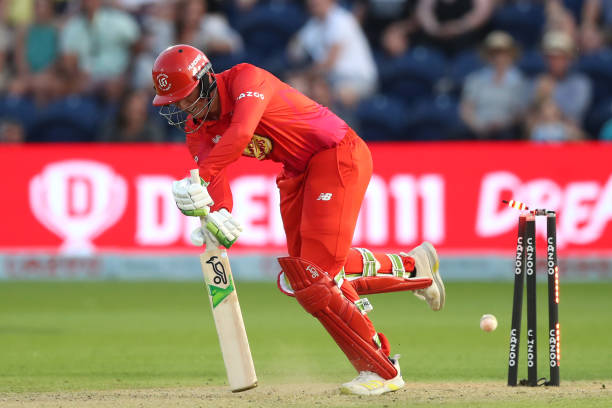By James Skeldon
A woeful Hundred campaign for Welsh Fire has lead to a fierce debate around the future of the team based in Cardiff. While attendances were up, the product on the pitch was poor, with only one win between the two sides, Welsh fans were left without any real excitement towards the crunch time of the competition.
Pundits and fans have been critical of the men’s side of the competition, often citing the lack of quality in the tournament having lost many big names to the CPL or International Cricket.
This led to a large imbalance between the teams and having lost the likes of Jonny Bairstow, Naseem Shah and Ollie Pope, Welsh spectators watched on as the men’s side struggled to compete.
The 2022 edition of The Hundred saw Trent Rockets emerge victorious as they chased down Manchester Originals’ first innings total in the final at Lords to be crowned champions. Their side were dominant from the start of the campaign as they finished top of the table before the knockout stages.
The less can be said about Welsh Fire who finished dead last with no wins from eight and truthfully, never looked like winning a match. So, what went wrong for them? What were they not doing that teams like Trent Rockets were?
8 games, 8 losses 😓
Welsh Fire are the first team to go winless in #TheHundred 📉 pic.twitter.com/Q26AglANQV
— ESPNcricinfo (@ESPNcricinfo) August 29, 2022
The number one issue for Welsh Fire this year was not getting enough powerplay runs. The opening partnership of Joe Clarke and Tom Banton showed great promise ahead of the tournament.
They are two of England’s most exciting and talented young batters. Banton fetched a 125k price tag this year but for him, as well as Clarke, it was a tournament to forget. The cumulative total of runs for Clarke and Banton this year was 185 from 190 balls.
Clarke averaged 12.75 at a SR of 92 whilst Banton averaged 13 at 103. These kind of performances from your openers will not win you cricket matches. Compare this to the champions of Trent Rockets with their opening partnership of Dawid Malan and Alex Hales, who were in scintillating form from start to finish.
Malan, in particular, shone and finished the tournament as leading run scorer with a huge average and strike rate. This produced the perfect platform for the likes of Tom Kohler-Cadmore, Lewis Gregory and Daniel Sams to capitalise on their start and post big totals.
The opening partnership was just the start of Fire’s batting woes as they only passed 140 on one occasion throughout the tournament. Their misfiring start had a knock-on effect for the rest of the line-up.
£1351.35
Cost per run of Banton / Clarke in #thehundred 2022 for Welsh Fire
— The Hundred Club (@thehundredclub1) August 29, 2022
Too much pressure fell onto the middle order to build an innings after the openers failed. David Miller looked horridly out of nick, and he is one of the most dangerous white ball batters in the world.
Welsh Fire would benefit so much from a stronger opening partnership. They showed on multiple occasions that they have the batting fire power lower down the order to really hurt teams.
Matthew Critichley, Leus Du Plooy and Dwaine Pretorious produced some impressive cameos throughout the tournament, but they just didn’t have the runs on the board to get up to a competitive total.
Fire can consider themselves to be somewhat unlucky that their gun bats at the top of the order weren’t firing. This, paired with the other marquee signings of Ollie Pope and Jonny Bairstow having to leave the squad for England duty, resulted in just a lack of batting quality to put runs on the board.
Welsh Fire, with an in-form batting line up would have been a different story altogether. Add Jonny Bairstow into the mix and they would undoubtedly have been challenging for the title. They all have the potential to be match winners, but they just didn’t fire this year.





